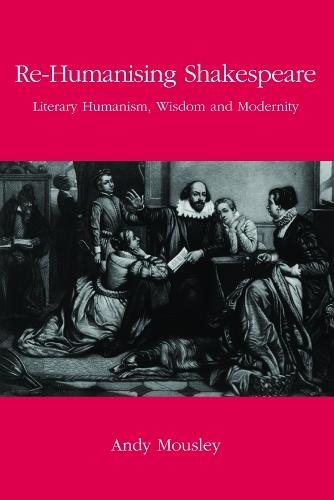Full Product Details
Author: Andy Mousley
Publisher: Edinburgh University Press
Imprint: Edinburgh University Press
Dimensions:
Width: 15.60cm
, Height: 2.40cm
, Length: 23.40cm
Weight: 0.482kg
ISBN: 9780748623181
ISBN 10: 0748623183
Pages: 224
Publication Date: 20 June 2007
Audience:
General/trade
,
Professional and scholarly
,
General
,
Professional & Vocational
Format: Hardback
Publisher's Status: Out of Print
Availability: Out of stock

Reviews
Can 'a literary humanism ! based on the possibility of human beings living better lives ! survive irony, pessimism and disenchantment[?]' Mousley asks (p. 164). His book helps us answers this question in the affirmative. Re-Humanising Shakespeare thus adds to a debate about the status of the human in Shakespeare's plays, but does so, significantly, by declining to caricature either side of the debate. Mousley is willing to listen to anti-foundationalists as well as foundationalists, to sceptics as well as believers. In this - in his respect for others and their voices - he clearly practices what his book preaches. -- Douglas Bruster, Issue 90:1 (2009) English Studies: A Journal of English Language and Literature An absorbing book, in which issues of what it means to be 'human' and 'how to live' are explored through sage and timely readings of Shakespeare's plays ! While this book leads its readers to think about Shakespeare afresh in terms of 'literary humanism', and away from a critical tradition often scathing about the very word 'human', the benefit of this thoughtful and well-crafted book is obvious from the outset: Re-Humanising Shakespeare returns us to a reinvigorated idea of why we read and think about literature, not just by 're-humanising' Shakespeare but by reminding us that Shakespearean drama possesses a powerful capacity to 're-humanise' us. -- Michael Davies, Issue 27:1 (2010) The Society for Renaissance Studies Bulletin Can 'a literary humanism ! based on the possibility of human beings living better lives ! survive irony, pessimism and disenchantment[?]' Mousley asks (p. 164). His book helps us answers this question in the affirmative. Re-Humanising Shakespeare thus adds to a debate about the status of the human in Shakespeare's plays, but does so, significantly, by declining to caricature either side of the debate. Mousley is willing to listen to anti-foundationalists as well as foundationalists, to sceptics as well as believers. In this - in his respect for others and their voices - he clearly practices what his book preaches. An absorbing book, in which issues of what it means to be 'human' and 'how to live' are explored through sage and timely readings of Shakespeare's plays ! While this book leads its readers to think about Shakespeare afresh in terms of 'literary humanism', and away from a critical tradition often scathing about the very word 'human', the benefit of this thoughtful and well-crafted book is obvious from the outset: Re-Humanising Shakespeare returns us to a reinvigorated idea of why we read and think about literature, not just by 're-humanising' Shakespeare but by reminding us that Shakespearean drama possesses a powerful capacity to 're-humanise' us.
Author Information
Andy Mousley is Senior Lecturer in English at De Montfort University, Leicester. He is the author of Critical Humanisms (2003, with Martin Halliwell), Renaissance Drama and Contemporary Literary Theory (2000) and the editor of New Casebooks: John Donne (1999). He is the co-editor of the Edinburgh Critical Guides to Literature series.




